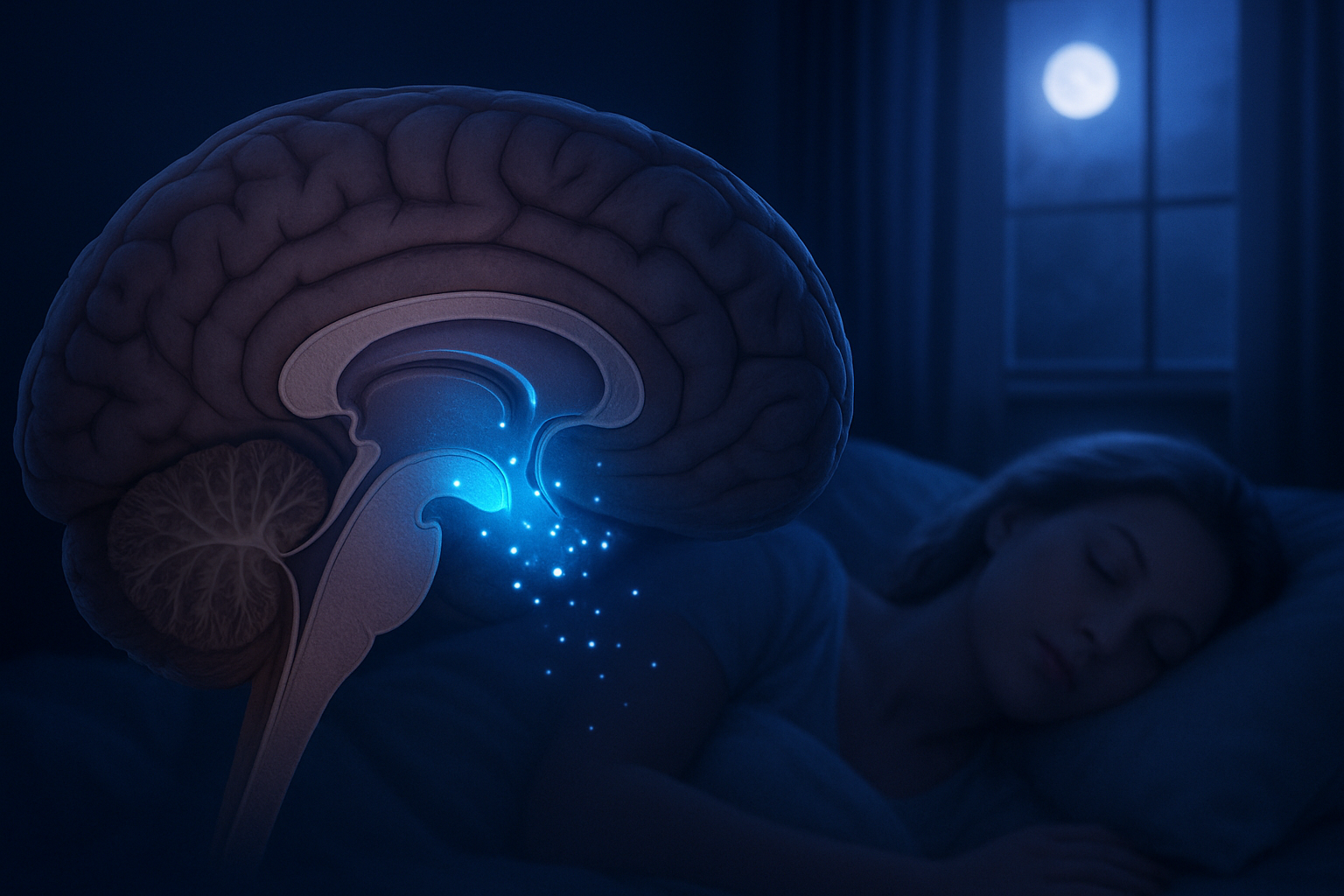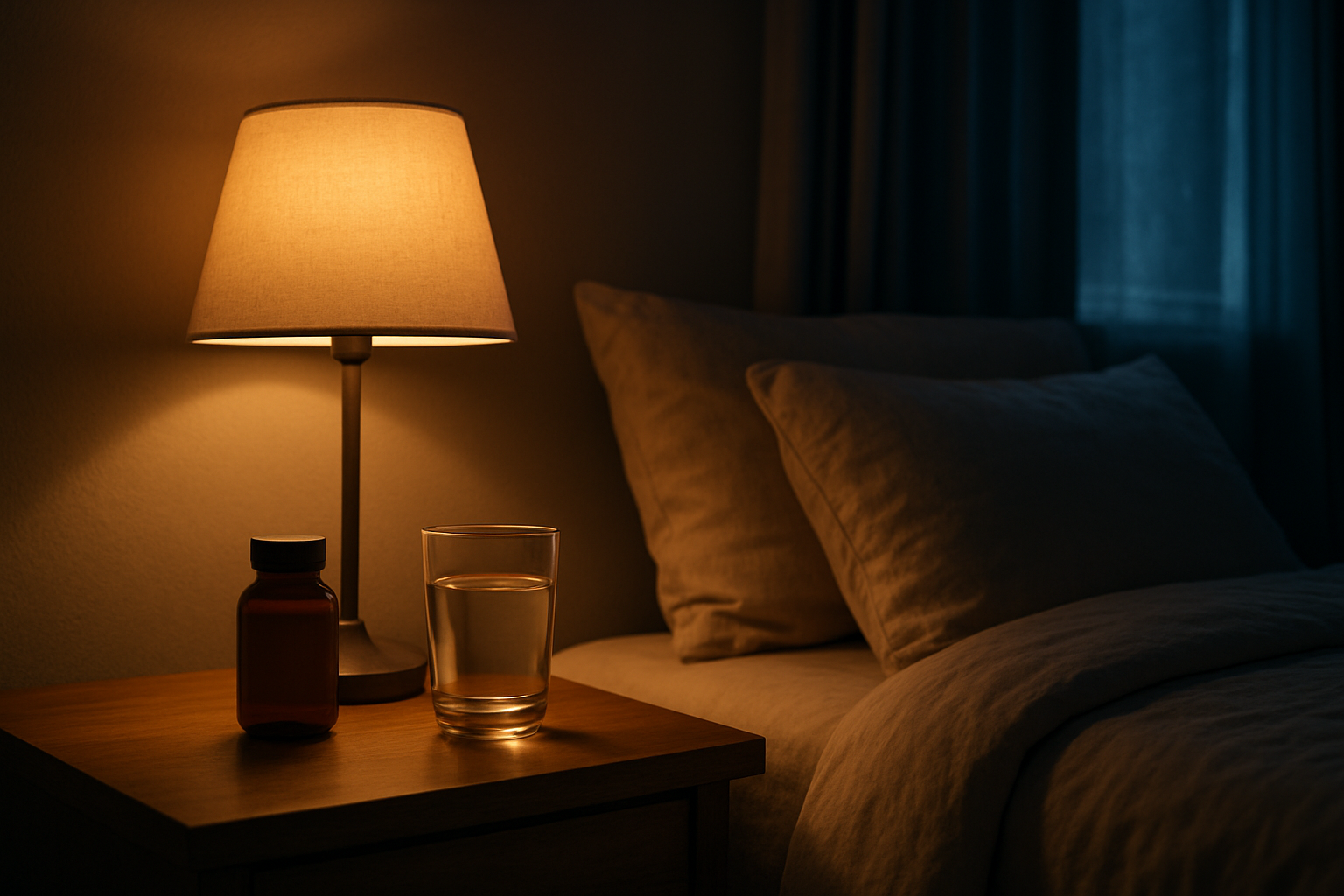Struggling to fall asleep or stay asleep through the night? You’re not alone. Millions of people deal with sleep issues that leave them tired, foggy, and frustrated the next day.
Melatonin supplement has become a popular natural solution for anyone looking to improve their sleep quality without prescription medications. This sleep hormone can help shift workers, frequent travelers, people with insomnia, and anyone whose sleep schedule has gotten off track.
We’ll explore how melatonin actually works in your body to regulate your sleep-wake cycle and dive into the research showing its real benefits for better rest. You’ll also learn the best dosage and timing strategies to get the most comfortable, restorative sleep possible.
Ready to finally get the quality sleep you deserve? Let’s break down everything you need to know about using melatonin safely and effectively.
Understanding Melatonin’s Natural Role in Sleep Regulation

How your body produces melatonin naturally
Your pineal gland, a tiny pea-sized structure deep in your brain, acts as your body’s master timekeeper for sleep. This small but mighty gland produces melatonin, a hormone that signals to your entire system when it’s time to wind down for the night. The process starts when darkness falls and light levels drop around you.
Your eyes contain special photoreceptive cells that detect changes in light exposure. When these cells sense decreasing light, they send signals through your nervous system to the pineal gland. This triggers the conversion of serotonin, your “feel-good” neurotransmitter, into melatonin through a series of enzymatic reactions.
The production ramps up gradually, typically beginning around 9 PM for most adults. Peak melatonin levels occur between 2-4 AM, then steadily decline as morning approaches. This natural rhythm creates what sleep experts call your “biological night” – the window when your body expects to be asleep.
The connection between melatonin and your circadian rhythm
Melatonin serves as the primary chemical messenger for your circadian rhythm, the internal 24-hour clock that regulates sleep-wake cycles. Your circadian rhythm controls much more than just sleepiness – it influences body temperature, hormone release, blood pressure, and even immune function.
This internal clock receives input from various environmental cues, with light being the strongest influence. Your suprachiasmatic nucleus (SCN), located in your hypothalamus, acts as the master circadian pacemaker. The SCN coordinates with your pineal gland to time melatonin release perfectly with your sleep needs.
When melatonin enters your bloodstream, it binds to specific receptors throughout your body, particularly in your brain. These receptors are found in areas that control sleep, body temperature, and arousal. The hormone essentially tells your body systems to prepare for rest by lowering core body temperature, reducing alertness, and promoting drowsiness.
Why melatonin levels decline with age
As you get older, your pineal gland gradually produces less melatonin, which explains why many older adults experience sleep difficulties. Research shows melatonin production can drop by as much as 50% between young adulthood and age 70.
Several factors contribute to this age-related decline:
- Pineal gland calcification: Over time, calcium deposits can accumulate in the pineal gland, reducing its efficiency
- Decreased enzyme activity: The enzymes responsible for converting serotonin to melatonin become less active with age
- Reduced light sensitivity: Aging eyes become less sensitive to light-dark transitions, weakening circadian signals
- Changes in sleep architecture: Older adults naturally experience lighter, more fragmented sleep patterns
This decline often leads to earlier bedtimes, frequent nighttime awakenings, and earlier morning wake times – a pattern many older adults recognize as their sleep quality changes.
Environmental factors that disrupt natural melatonin production
Modern life presents numerous challenges to your body’s natural melatonin production. Blue light exposure from screens, phones, and LED bulbs can significantly suppress melatonin synthesis, even in small amounts. Your brain interprets this artificial light as daylight, delaying the evening melatonin surge by hours.
Temperature also plays a crucial role. Sleeping in rooms that are too warm can interfere with the natural drop in core body temperature that accompanies melatonin release. Your bedroom should ideally stay between 60-67°F for optimal melatonin function.
Other disruptive factors include:
- Shift work or irregular schedules: Constantly changing sleep times confuses your circadian system
- Jet lag: Crossing time zones faster than your internal clock can adjust
- Caffeine consumption: Especially within 6 hours of bedtime
- Alcohol intake: While initially sedating, alcohol disrupts later sleep stages and melatonin patterns
- Stress and anxiety: Elevated cortisol levels can suppress melatonin production
- Certain medications: Including beta-blockers, NSAIDs, and some antidepressants
Even seemingly minor disruptions like checking your phone during nighttime bathroom trips can reset your melatonin production, making it harder to fall back asleep.
Scientific Evidence Behind Melatonin’s Sleep Benefits

Clinical Studies Proving Melatonin’s Effectiveness for Sleep Onset
Multiple randomized controlled trials have demonstrated melatonin’s ability to significantly reduce the time it takes to fall asleep. A landmark meta-analysis examining 19 studies involving over 1,700 participants found that melatonin reduced sleep onset latency by an average of 7.2 minutes compared to placebo. While this might seem modest, the consistency across studies makes it clinically meaningful.
The most compelling evidence comes from studies involving shift workers and people with delayed sleep phase syndrome. Research published in the Journal of Clinical Medicine showed that 3mg of melatonin taken 30 minutes before desired bedtime helped night shift workers fall asleep 23% faster during daytime sleep periods. Another study focusing on teenagers with delayed sleep patterns found that low-dose melatonin (0.5mg) advanced sleep onset by nearly 40 minutes.
Dosage timing plays a crucial role in effectiveness. Studies consistently show that taking melatonin 30-60 minutes before intended sleep time produces the best results for sleep initiation. Higher doses don’t necessarily work faster – research indicates that 0.5-3mg doses are often as effective as 5-10mg doses for reducing sleep onset time, with lower doses causing fewer next-day grogginess effects.
Research on Melatonin’s Impact on Sleep Duration and Quality
Sleep duration improvements with melatonin supplementation vary significantly based on individual factors and underlying sleep issues. A comprehensive review of 15 clinical trials revealed that melatonin increased total sleep time by an average of 25 minutes per night. However, people with more severe sleep difficulties experienced greater benefits, with some studies showing sleep duration increases of up to 48 minutes.
Quality metrics show even more impressive results. Sleep efficiency – the percentage of time actually spent sleeping while in bed – improved by 7-15% in most studies. Participants reported feeling more refreshed upon waking, with sleep quality scores improving by 20-30% on standardized assessments. Brain wave studies using electroencephalography confirmed that melatonin helps achieve deeper, more restorative sleep stages.
The benefits appear cumulative rather than immediate. While some people notice improvements within the first few nights, research shows that optimal sleep quality improvements typically occur after 1-2 weeks of consistent use. Long-term studies spanning 3-6 months demonstrate sustained benefits without tolerance development, meaning the supplement continues working without requiring dose increases.
How Melatonin Reduces Nighttime Awakenings
Sleep maintenance represents one of melatonin’s strongest therapeutic applications. Clinical studies show that regular melatonin supplementation can reduce nighttime awakenings by 30-50% compared to baseline measurements. This improvement stems from melatonin’s ability to maintain stable sleep architecture throughout the night.
Research using sleep monitoring devices reveals that melatonin users spend less time in light sleep stages and experience fewer brief arousals that fragment sleep continuity. A study published in Sleep Medicine tracked 200 adults with sleep maintenance insomnia for 12 weeks. Participants taking 2mg extended-release melatonin experienced 40% fewer awakenings lasting longer than 5 minutes compared to the placebo group.
The mechanism involves melatonin’s regulation of core body temperature and cortisol levels throughout the night. Studies show that supplemental melatonin helps maintain the natural temperature drop that promotes deep sleep, while also preventing early morning cortisol spikes that can cause premature awakening. Brain imaging studies demonstrate increased activity in sleep-promoting regions and decreased activity in areas associated with arousal and stress response.
Extended-release formulations show particular effectiveness for sleep maintenance. Research comparing immediate-release versus extended-release melatonin found that sustained-release versions reduced middle-of-the-night awakenings by an additional 25% compared to standard formulations, likely due to maintained melatonin levels throughout the sleep period.
Key Ways Melatonin Enhances Sleep Quality

Faster time to fall asleep after taking melatonin
Melatonin works by mimicking your body’s natural sleep signal, essentially telling your brain it’s time to wind down. When you take a supplement 30-60 minutes before your desired bedtime, melatonin levels in your bloodstream rise above normal nighttime levels, creating a stronger drowsiness signal than your body might produce on its own.
This enhanced signal helps quiet racing thoughts and reduces the physical restlessness that often keeps people tossing and turning. Studies show that melatonin can reduce sleep onset time by an average of 7-12 minutes, though individual results vary significantly. People with insomnia or disrupted circadian rhythms often experience even more dramatic improvements, sometimes falling asleep 20-30 minutes faster than without supplementation.
The key lies in melatonin’s ability to synchronize your internal clock with your desired sleep schedule. Unlike sedatives that force drowsiness, melatonin works with your natural biology to create a gentle transition from wakefulness to sleep.
Deeper, more restorative sleep phases
Melatonin doesn’t just help you fall asleep – it actively improves the architecture of your sleep cycles. Research demonstrates that melatonin supplementation increases time spent in deeper sleep stages, particularly slow-wave sleep (Stage 3), which is when your body performs its most critical restoration work.
During these enhanced deep sleep phases, your brain consolidates memories more effectively, your immune system strengthens, and cellular repair processes accelerate. Growth hormone release also peaks during deep sleep, making this stage essential for physical recovery and tissue repair.
Sleep studies using EEG monitoring reveal that people taking melatonin experience:
- Increased delta wave activity: The brain waves associated with the deepest, most restorative sleep
- Extended REM sleep periods: Critical for emotional processing and cognitive function
- More efficient sleep cycles: Smoother transitions between sleep stages without frequent micro-awakenings
This improved sleep quality means you wake up feeling more refreshed and mentally sharp, even if your total sleep time remains unchanged.
Reduced sleep fragmentation throughout the night
One of melatonin’s most valuable benefits is its ability to maintain sleep continuity. Sleep fragmentation – those brief awakenings that interrupt your sleep cycles – can devastate sleep quality even when you don’t fully remember waking up.
Melatonin helps maintain elevated levels throughout the night, creating a protective buffer against external disturbances like noise, light, or temperature changes. This sustained melatonin presence keeps your nervous system in sleep mode, reducing the likelihood of spontaneous awakenings.
People who supplement with melatonin report fewer midnight bathroom trips, less sensitivity to partner movement, and reduced awakening from minor environmental changes. Sleep tracking data consistently shows fewer interruptions and longer periods of unbroken sleep among regular melatonin users.
The supplement also helps regulate core body temperature throughout the night. Since temperature fluctuations can trigger awakenings, melatonin’s temperature-regulating effects create a more stable sleep environment from within your own body.
Better sleep consistency and routine establishment
Melatonin excels at creating predictable sleep patterns, making it particularly valuable for people with irregular schedules or circadian rhythm disorders. By taking melatonin at the same time each evening, you essentially train your body to expect sleep at a specific hour.
This consistency extends beyond just bedtime. Regular melatonin use helps establish earlier natural melatonin production, gradually shifting your internal clock toward your desired schedule. Over time, many people find they need smaller doses or can eventually maintain their improved sleep pattern with minimal supplementation.
The routine-building aspect proves especially beneficial for:
| Sleep Challenge | How Melatonin Helps |
|---|---|
| Shift work | Resets circadian rhythm for new schedule |
| Jet lag | Accelerates adjustment to new time zones |
| Weekend sleep-in habits | Maintains consistent wake times |
| Seasonal changes | Counters disruptions from changing daylight |
| Stress-induced insomnia | Provides reliable sleep trigger despite anxiety |
This predictability reduces sleep anxiety – that worry about whether you’ll be able to fall asleep that ironically keeps you awake. Knowing you have a reliable tool for sleep initiation often relaxes the mind enough to improve natural sleep onset over time.
Optimal Dosage and Timing for Maximum Sleep Comfort

Finding Your Ideal Melatonin Dosage Range
Most people think more is always better when it comes to supplements, but melatonin works differently. The sweet spot for most adults falls between 0.5 to 3 milligrams, with many finding their perfect dose at just 1-2 mg. Your body naturally produces only about 0.3 mg of melatonin per night, so even small supplement amounts can make a significant difference.
Start with the lowest possible dose – around 0.5 mg – and gradually increase if needed. Some people respond beautifully to micro-doses as small as 0.3 mg, while others may need up to 5 mg for stubborn sleep issues. Higher doses don’t necessarily mean better sleep and can actually backfire, leaving you groggy the next morning or disrupting your natural melatonin production.
Pay attention to how you feel the morning after taking melatonin. If you wake up refreshed and alert, you’ve likely found your ideal dose. Grogginess or difficulty waking up often signals the dose is too high. Keep a sleep journal tracking your dosage, sleep quality, and morning alertness to identify patterns and fine-tune your approach.
Perfect Timing for Taking Melatonin Before Bedtime
Timing matters just as much as dosage when it comes to melatonin effectiveness. The magic window is typically 30 minutes to 2 hours before your intended bedtime, with most people finding 1-1.5 hours works best. This timing allows melatonin levels to rise gradually, mimicking your body’s natural rhythm.
Your melatonin type affects timing too. Fast-release formulas work best when taken 30-60 minutes before bed, while extended-release versions may need 1-2 hours for optimal effect. Taking melatonin too early can make you drowsy during evening activities, while taking it too late means you might still be waiting to feel sleepy when your head hits the pillow.
Consider your personal sleep schedule and circadian rhythm. Night owls might benefit from taking melatonin slightly earlier to help shift their natural bedtime forward, while early risers may need less lead time. Consistency is key – try to take your melatonin at the same time each night to reinforce your body’s sleep-wake cycle.
Duration Recommendations for Safe Melatonin Use
Melatonin works best as a short-term sleep aid rather than a permanent solution. Most sleep specialists recommend using melatonin for 1-4 weeks at a time, especially when addressing temporary sleep disruptions like jet lag, shift work, or stress-related insomnia. This approach prevents your body from becoming dependent on external melatonin sources.
For chronic sleep issues, consider cycling your melatonin use – take it for 2-3 weeks, then take a break for a week or two. This prevents tolerance buildup and allows your natural melatonin production to reset. Some people successfully use melatonin intermittently, taking it only when they anticipate sleep difficulties or during particularly stressful periods.
Long-term daily use isn’t necessarily dangerous, but it may reduce effectiveness over time. If you find yourself relying on melatonin nightly for months, it’s worth consulting a healthcare provider to address underlying sleep issues. They might recommend sleep hygiene improvements, stress management techniques, or investigate other factors affecting your sleep quality.
Monitor your sleep patterns regularly and reassess whether you still need melatonin supplementation. Many people discover that after establishing better sleep habits with melatonin’s help, they can maintain good sleep quality without continued supplementation.
Choosing the Right Melatonin Supplement Form

Immediate-release vs Extended-release Formulations
When you’re standing in the supplement aisle trying to pick a melatonin product, you’ll notice two main types: immediate-release and extended-release. Each works differently in your body, and choosing the right one depends on your specific sleep challenges.
Immediate-release melatonin dissolves quickly and floods your system within 30 minutes. This type works best if you struggle to fall asleep initially. Your melatonin levels spike fast, helping trigger that sleepy feeling, but they also drop off relatively quickly – usually within 4-6 hours.
Extended-release formulations take a different approach. They release melatonin slowly over 6-8 hours, mimicking your body’s natural melatonin production pattern. This option shines if you fall asleep fine but wake up frequently during the night or find yourself wide awake at 3 AM.
| Formulation Type | Best For | Duration | Ideal User |
|---|---|---|---|
| Immediate-release | Falling asleep | 4-6 hours | Sleep onset issues |
| Extended-release | Staying asleep | 6-8 hours | Middle-of-night waking |
Some people benefit from combination products that include both types, giving you the quick sleep onset plus sustained support throughout the night.
Natural vs Synthetic Melatonin Options
The melatonin debate often centers on natural versus synthetic versions, but the reality might surprise you. Most “natural” melatonin comes from animal pineal glands, which raises concerns about contamination and consistency. Synthetic melatonin, created in laboratories, actually offers better purity and standardization.
Synthetic melatonin is molecularly identical to what your body produces. Manufacturing processes can control exact dosages and eliminate potential contaminants that might exist in animal-derived versions. The synthetic option also provides better batch-to-batch consistency, meaning you get the same potency every time.
Plant-based melatonin alternatives like tart cherry extract contain small amounts of natural melatonin along with other compounds that may support sleep. While these provide a gentler approach, the melatonin content varies significantly and may not deliver the precise dosing needed for consistent results.
For most people, pharmaceutical-grade synthetic melatonin offers the best balance of safety, consistency, and effectiveness. Look for products that clearly state “USP grade” or “pharmaceutical grade” on the label.
Additional Sleep-Supporting Ingredients to Look For
Smart supplement manufacturers often combine melatonin with other natural compounds that work together to improve sleep quality. These combinations can address multiple aspects of sleep challenges beyond just melatonin’s role.
Magnesium pairs exceptionally well with melatonin. This mineral helps relax muscles and calm the nervous system, working alongside melatonin’s sleep-inducing effects. Studies show magnesium can improve sleep efficiency and reduce the time it takes to fall asleep.
L-theanine, an amino acid found in tea leaves, promotes relaxation without drowsiness during the day. When combined with melatonin, it can help quiet racing thoughts that keep you awake while enhancing the overall sleep experience.
GABA (gamma-aminobutyric acid) serves as your brain’s primary inhibitory neurotransmitter. It helps shut down excessive mental activity that interferes with sleep onset. Products combining GABA with melatonin often produce deeper, more restorative sleep.
Chamomile extract has been used for centuries as a gentle sleep aid. Its active compound, apigenin, binds to brain receptors that promote sleepiness and reduce anxiety.
Valerian root offers another traditional approach to sleep support. While it has a distinctive smell that some find off-putting, valerian can help reduce the time needed to fall asleep and improve overall sleep satisfaction.
Quality Markers That Indicate Effective Supplements
Not all melatonin supplements deliver what they promise on the label. Research has found dramatic variations in actual melatonin content – sometimes containing 83% less or 478% more than advertised. Knowing what to look for helps you find products that actually work.
Third-party testing represents the gold standard for supplement quality. Look for certifications from organizations like NSF International, USP (United States Pharmacopeia), or ConsumerLab. These independent groups verify that products contain what the label claims without harmful contaminants.
Manufacturing standards matter tremendously. Seek out products made in facilities that follow Good Manufacturing Practices (GMP). This ensures consistent production methods and quality control measures throughout the manufacturing process.
Dissolution testing information, while rarely advertised prominently, shows whether tablets or capsules actually break down properly in your digestive system. Some poorly made supplements pass through your body without releasing their contents.
Certificate of Analysis (COA) documents provide detailed information about each batch’s purity and potency. Reputable companies make these available upon request or post them on their websites.
Expiration dates and proper storage instructions indicate a manufacturer’s commitment to product stability. Melatonin can degrade over time, especially when exposed to heat, light, or moisture.
Avoid products with unnecessary fillers, artificial colors, or preservatives that serve no functional purpose. The shorter the ingredient list, the better – assuming it contains the active compounds you’re seeking.
Maximizing Melatonin’s Sleep Benefits Through Lifestyle Integration

Creating an Ideal Sleep Environment for Melatonin Effectiveness
Your bedroom environment plays a huge role in how well melatonin works. Think of it as setting the stage for your body’s natural sleep processes. The temperature should be cool, ideally between 65-68°F, because your body naturally drops its temperature when preparing for sleep. When you take melatonin in a warm room, you’re fighting against this natural cooling process.
Darkness is absolutely critical. Even small amounts of light can interfere with melatonin production and effectiveness. Blackout curtains or heavy drapes work wonders, and if those aren’t enough, consider an eye mask. Street lights, electronics, and even the glow from your alarm clock can disrupt the process.
Sound control matters too. White noise machines, earplugs, or even a simple fan can mask disruptive noises that might wake you during lighter sleep phases. Your mattress and pillows should support comfortable sleep positions without causing pain or frequent repositioning throughout the night.
Remove or cover any LED lights from electronics in your bedroom. That tiny blue light from your phone charger or cable box might seem harmless, but it can actually signal your brain to stay alert, working against the melatonin you’ve taken.
Combining Melatonin with Proven Sleep Hygiene Practices
Melatonin works best when combined with solid sleep habits, not used as a standalone solution. Start by keeping a consistent sleep schedule, even on weekends. Your body’s internal clock loves routine, and when you pair this predictability with melatonin, the effects amplify significantly.
Create a relaxing bedtime routine that starts 30-60 minutes before you plan to sleep. This might include gentle stretching, reading, meditation, or taking a warm bath. The key is doing the same activities in the same order each night, which signals your brain that sleep time is approaching.
Avoid large meals, caffeine, and alcohol close to bedtime. Caffeine can stay in your system for 6-8 hours, so that afternoon coffee might still be affecting you at night. Alcohol might make you feel drowsy initially, but it disrupts sleep quality later in the night, reducing melatonin’s effectiveness.
Exercise regularly, but not too close to bedtime. Physical activity during the day helps regulate your circadian rhythm and can make melatonin more effective. Just finish intense workouts at least 3-4 hours before taking your supplement.
Keep a sleep diary to track what works best for you. Note when you take melatonin, what you did before bed, how long it took to fall asleep, and how you felt the next morning.
Managing Screen Time and Light Exposure for Better Results
Blue light from screens is melatonin’s biggest enemy. Your phone, tablet, computer, and TV all emit wavelengths that tell your brain it’s daytime, suppressing natural melatonin production and reducing the effectiveness of supplements.
Stop using screens at least one hour before taking melatonin. If you absolutely must use devices, invest in blue light blocking glasses or install apps that filter blue light automatically as evening approaches. Many phones now have built-in “night mode” settings that warm the screen color after sunset.
Morning light exposure is just as important as avoiding evening light. Get outside within the first hour of waking up, even if it’s cloudy. This natural light exposure helps regulate your circadian rhythm and ensures your body produces melatonin at the right time later.
Consider the timing of indoor lighting too. Bright overhead lights in the evening can interfere with melatonin effectiveness. Switch to dimmer, warmer lights 2-3 hours before bedtime. Lamps with yellow or amber bulbs create a more sleep-friendly atmosphere than bright white fluorescents.
If you work night shifts or have irregular schedules, blackout curtains become even more important. You might need to take melatonin at different times to reset your sleep schedule, and controlling your light environment becomes the key to making this work effectively.

Melatonin supplements offer a natural path to better sleep by working with your body’s existing sleep-wake cycle. The research shows clear benefits for falling asleep faster, staying asleep longer, and waking up more refreshed. Getting the dosage and timing right matters – starting with lower amounts taken 30-60 minutes before bedtime gives most people the best results.
The key to success with melatonin goes beyond just taking a pill. Combining the right supplement form with healthy sleep habits like keeping a consistent bedtime, limiting screen time, and creating a relaxing evening routine will give you the most restful nights. If you’ve been struggling with sleep quality, melatonin could be the gentle, effective solution you need to finally get the restorative sleep your body craves.









